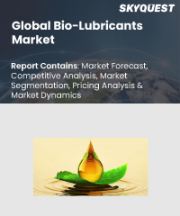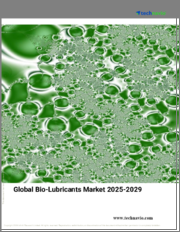
|
시장보고서
상품코드
1642512
바이오 윤활유 시장 보고서 : 기유 유형별, 용도별, 최종 이용 산업별, 지역별(2025-2033년)Bio-Lubricants Market Report by Base Oil Type, Application, End Use Industry, and Region 2025-2033 |
||||||
세계의 바이오 윤활유 시장 규모는 2024년 24억 달러에 달했습니다. IMARC Group은 2025년부터 2033년까지의 성장률(CAGR)은 3.3%로 전망되며, 2033년까지는 32억 1,000만 달러에 달할 것으로 예측했습니다. 이 시장은 바이오 베이스 제품의 건강에 대한 이점에 관한 개인 의식의 고조, 오염 레벨을 억제하기 위한 엄격한 환경 규제, 자동차의 성능 유지에 대한 주목의 고조 등을 배경으로 안정된 성장을 이루고 있습니다.
바이오 윤활유 시장 동향 :
환경 규제 및 지속가능성에 대한 노력
세계 시장은 엄격한 환경규제와 지속가능성의 중시 고조에 영향을 크게 받고 있습니다. 세계 각국의 정부는 이산화탄소 배출량을 줄이고 오염을 억제하기 위한 정책을 제정하고 있으며, 이는 윤활유 산업에 직접적인 영향을 미칩니다. 다른 지역에서도 이러한 규제와 유사한 노력을 통해 환경 친화적인 윤활유를 채택하는 것이 좋습니다. 이 윤활유는 식물성 기름과 다른 재생 가능한 자원에서 파생되며 기존의 미네랄 기반 윤활유를 대체하는 지속 가능한 대안을 제공합니다. 이들은 생분해성이며 독성이 없으며 제조와 폐기 모두에서 환경에 미치는 영향이 적습니다. 이러한 규제환경은 환경의 지속가능성에 대한 기업의 책임이 증가함에 따라 자동차, 산업, 해양분야 등 다양한 용도에 대한 수요를 견인하고 있습니다.
기술 진보 및 성능 향상
제형과 생산의 기술적 진보는 시장 성장에 크게 기여하고 있습니다. 초기 품종은 합성품에 비해 산화 안정성이 낮고 온도 성능이 낮다는 과제에 직면했습니다. 그러나 최근의 동향은 이러한 한계를 극복하고 바이오 윤활유의 열 안정성, 산화 안정성, 내하중성 및 수명을 향상시키고 있습니다. 이러한 개선은 기존의 윤활유와 경쟁할 수 있게 되며, 어떤 경우에는 그보다 더 우수합니다. 이와 함께 연구개발의 강화는 바이오기반 첨가제와 혁신적인 제조기술의 채용으로 이어져 이러한 윤활유의 성능 특성을 더욱 향상시키고 있습니다. 이러한 진보는 적용 범위를 확대하고 보다 까다로운 다양한 산업 용도 분야에서 실행 가능한 옵션으로 매우 중요하며 시장 성장에 박차를 가하고 있습니다.
지속가능한 제품에 대한 소비자 의식 및 수요 증가
소비자 선호 환경 친화적이고 지속 가능한 제품으로 이동하는 것은 시장의 주요 촉진요인입니다. 소비자들 사이에서 자동차와 기계에 사용되는 윤활유를 포함하여 그 선택이 환경에 미치는 영향에 대한 인식이 높아지고 있습니다. 이러한 의식은 소셜 미디어 및 세계 환경 캠페인에 의해 더욱 강화되어 환경 친화적인 제품에 대한 수요가 증가하고 있습니다. 바이오 윤활유는 재생 가능한 자원을 원료로 하고 있으며, 이러한 소비자의 가치관에 합치하고 있습니다. 바이오 윤활유는 생분해성, 저독성, 이산화탄소 배출량을 줄이는 점에서 환경에 미치는 영향을 줄입니다. 이와 같이 소비자의 윤리관이나 환경에 대한 관심과 일치함으로써, 제조업체는 보다 적극적인 투자나 마케팅을 실시하게 되어 시장이 전진하고 있습니다. 이러한 소비자 주도 수요는 지속 가능한 선택지로의 투자에 대한 의식 및 의욕이 높은 신흥 경제 국가에서 특히 두드러집니다.
목차
제1장 서문
제2장 조사 범위 및 조사 방법
- 조사의 목적
- 이해관계자
- 데이터 소스
- 1차 정보
- 2차 정보
- 시장 추정
- 상향식 접근
- 하향식 접근
- 예측 조사 방법
제3장 주요 요약
제4장 서문
- 개요
- 주요 업계 동향
제5장 세계의 바이오 윤활유 시장
- 시장 개요
- 시장 실적
- COVID-19의 영향
- 시장 예측
제6장 시장 내역 : 기유 유형별
- 식물성 기름
- 시장 동향
- 시장 예측
- 동물성 지방
- 시장 동향
- 시장 예측
제7장 시장 내역 : 용도별
- 유압 작동유
- 시장 동향
- 시장 예측
- 금속 가공유
- 시장 동향
- 시장 예측
- 체인 톱 오일
- 시장 동향
- 시장 예측
- 이형제
- 시장 동향
- 시장 예측
- 2사이클 엔진 오일
- 시장 동향
- 시장 예측
- 기어 오일 및 그리스
- 시장 동향
- 시장 예측
- 기타
- 시장 동향
- 시장 예측
제8장 시장 내역 : 최종 이용 산업별
- 발전
- 시장 동향
- 시장 예측
- 자동차
- 시장 동향
- 시장 예측
- 중장비
- 시장 동향
- 시장 예측
- 식품 및 음료
- 시장 동향
- 시장 예측
- 야금학 및 금속가공
- 시장 동향
- 시장 예측
- 화학제조
- 시장 동향
- 시장 예측
- 기타
- 시장 동향
- 시장 예측
제9장 시장 내역 : 지역별
- 북미
- 미국
- 캐나다
- 아시아태평양
- 중국
- 일본
- 인도
- 한국
- 호주
- 인도네시아
- 기타
- 유럽
- 독일
- 프랑스
- 영국
- 이탈리아
- 스페인
- 러시아
- 기타
- 라틴아메리카
- 브라질
- 멕시코
- 기타
- 중동 및 아프리카
- 시장 동향
- 시장 내역 : 국가별
- 시장 예측
제10장 SWOT 분석
- 개요
- 강점
- 약점
- 기회
- 위협
제11장 밸류체인 분석
제12장 Porter's Five Forces 분석
- 개요
- 구매자의 협상력
- 공급기업의 협상력
- 경쟁도
- 신규 참가업체의 위협
- 대체품의 위협
제13장 가격 분석
제14장 경쟁 구도
- 시장 구조
- 주요 기업
- 주요 기업 프로파일
- Albemarle Corporation
- BP Plc
- Chevron Corporation
- Emery Oleochemicals
- Exxon Mobil Corporation
- Fuchs Petrolub SE
- Kluber Lubrication Munchen SE & Co. KG(Freudenberg Chemical Specialities SE & Co. KG)
- Panolin AG
- Polnox Corporation
- Quaker Chemical Corporation
- Royal Dutch Shell PLC
- Total SE
The global bio-lubricants market size reached USD 2.40 Billion in 2024. Looking forward, IMARC Group expects the market to reach USD 3.21 Billion by 2033, exhibiting a growth rate (CAGR) of 3.3% during 2025-2033. The market is experiencing stable growth driven by the increasing awareness among individuals about the benefits of bio-based products on health, stringent environmental regulations to curb pollution levels, and rising focus on maintaining vehicle performance.
Bio-Lubricants Market Trends:
Environmental regulations and sustainability initiatives
The global market is significantly influenced by stringent environmental regulations and a growing emphasis on sustainability. Governments worldwide are enacting policies to reduce carbon footprints and control pollution, which directly impacts the lubricant industry. The regulations and similar initiatives in other regions are encouraging the adoption of environmentally friendly lubricants. These lubricants are derived from vegetable oils and other renewable sources, and offer a sustainable alternative to traditional mineral-based lubricants. They are biodegradable, non-toxic, and have a lesser environmental impact in terms of both production and disposal. This regulatory environment, combined with increasing corporate responsibility towards environmental sustainability, drives demand in various applications, including automotive, industrial, and marine sectors.
Technological advancements and improved performance
Technological advancements in formulation and production contribute significantly to market growth. Early variants faced challenges such as poor oxidative stability and lower temperature performance compared to their synthetic counterparts. However, recent developments have overcome these limitations, enhancing thermal and oxidative stability, load-carrying capacity, and longevity of bio-lubricants. Such improvements make them more competitive with, and in some cases superior to, conventional lubricants. Along with this, enhanced R&D efforts are leading to the introduction of bio-based additives and innovative production techniques, further improving the performance attributes of these lubricants. These advancements are pivotal in expanding their application range, making them a viable option in more demanding and diverse industrial applications, thereby fueling market growth.
Increasing consumer awareness and demand for sustainable products
The shift in consumer preferences towards environmentally friendly and sustainable products is a key driver for the market. There is a growing awareness among consumers about the environmental impact of their choices, including the lubricants used in vehicles and machinery. This awareness is further bolstered by social media and global environmental campaigns, leading to increased demand for green products. Bio-lubricants, being derived from renewable resources, align well with these consumer values. They offer a reduced environmental impact in terms of biodegradability, lower toxicity, and reduced carbon emissions. This alignment with consumer ethics and environmental concerns encourages manufacturers to invest in and market more aggressively, thus propelling the market forward. This consumer-driven demand is especially pronounced in developed economies, where there is a higher awareness and willingness to invest in sustainable options.
Bio-Lubricants Market Segmentation:
Breakup by Base Oil Type:
Vegetable Oils
Animal Fats
Animal fats dominate the market
Breakup by Application:
Hydraulic Fluids
Metalworking Fluids
Chainsaw Oils
Mold Release Agents
Two-Cycle Engine Oils
Gear Oils and Greases
Others
Two-cycle engine oils hold the largest share in the market
Breakup by End Use Industry:
Power Generation
Automotive
Heavy Equipment
Food & Beverage
Metallurgy & Metalworking
Chemical Manufacturing
Others
Automotive holds the largest share of the market
Breakup by Region:
North America
United States
Canada
Asia-Pacific
China
Japan
India
South Korea
Australia
Indonesia
Others
Europe
Germany
France
United Kingdom
Italy
Spain
Russia
Others
Latin America
Brazil
Mexico
Others
Middle East and Africa
North America leads the market, accounting for the largest bio-lubricants market share
The market research report has also provided a comprehensive analysis of all the major regional markets, which include North America (the United States and Canada); Asia Pacific (China, Japan, India, South Korea, Australia, Indonesia, and others); Europe (Germany, France, the United Kingdom, Italy, Spain, Russia, and others); Latin America (Brazil, Mexico, and others); and the Middle East and Africa. According to the report, North America accounted for the largest market share.
The market research report has provided a comprehensive analysis of the competitive landscape. Detailed profiles of all major companies have also been provided. Some of the key players in the market include:
Albemarle Corporation
BP Plc
Chevron Corporation
Emery Oleochemicals
Exxon Mobil Corporation
Fuchs Petrolub SE
Kluber Lubrication Munchen SE & Co. KG (Freudenberg Chemical Specialities SE & Co. KG)
Panolin AG
Polnox Corporation
Quaker Chemical Corporation
Royal Dutch Shell PLC
Total SE
Key Questions Answered in This Report
- 1. What was the size of the global bio-lubricants market in 2024?
- 2. What is the expected growth rate of the global bio-lubricants market during 2025-2033?
- 3. What are the key factors driving the global bio-lubricants market?
- 4. What has been the impact of COVID-19 on the global bio-lubricants market?
- 5. What is the breakup of the global bio-lubricants market based on the base oil type?
- 6. What is the breakup of the global bio-lubricants market based on application?
- 7. What is the breakup of the global bio-lubricants market based on the end use industry?
- 8. What are the key regions in the global bio-lubricants market?
- 9. Who are the key players/companies in the global bio-lubricants market?
Table of Contents
1 Preface
2 Scope and Methodology
- 2.1 Objectives of the Study
- 2.2 Stakeholders
- 2.3 Data Sources
- 2.3.1 Primary Sources
- 2.3.2 Secondary Sources
- 2.4 Market Estimation
- 2.4.1 Bottom-Up Approach
- 2.4.2 Top-Down Approach
- 2.5 Forecasting Methodology
3 Executive Summary
4 Introduction
- 4.1 Overview
- 4.2 Key Industry Trends
5 Global Bio-lubricants Market
- 5.1 Market Overview
- 5.2 Market Performance
- 5.3 Impact of COVID-19
- 5.4 Market Forecast
6 Market Breakup by Base Oil Type
- 6.1 Vegetable Oils
- 6.1.1 Market Trends
- 6.1.2 Market Forecast
- 6.2 Animal Fats
- 6.2.1 Market Trends
- 6.2.2 Market Forecast
7 Market Breakup by Application
- 7.1 Hydraulic Fluids
- 7.1.1 Market Trends
- 7.1.2 Market Forecast
- 7.2 Metalworking Fluids
- 7.2.1 Market Trends
- 7.2.2 Market Forecast
- 7.3 Chainsaw Oils
- 7.3.1 Market Trends
- 7.3.2 Market Forecast
- 7.4 Mold Release Agents
- 7.4.1 Market Trends
- 7.4.2 Market Forecast
- 7.5 Two-Cycle Engine Oils
- 7.5.1 Market Trends
- 7.5.2 Market Forecast
- 7.6 Gear Oils and Greases
- 7.6.1 Market Trends
- 7.6.2 Market Forecast
- 7.7 Others
- 7.7.1 Market Trends
- 7.7.2 Market Forecast
8 Market Breakup by End Use Industry
- 8.1 Power Generation
- 8.1.1 Market Trends
- 8.1.2 Market Forecast
- 8.2 Automotive
- 8.2.1 Market Trends
- 8.2.2 Market Forecast
- 8.3 Heavy Equipment
- 8.3.1 Market Trends
- 8.3.2 Market Forecast
- 8.4 Food & Beverage
- 8.4.1 Market Trends
- 8.4.2 Market Forecast
- 8.5 Metallurgy & Metalworking
- 8.5.1 Market Trends
- 8.5.2 Market Forecast
- 8.6 Chemical Manufacturing
- 8.6.1 Market Trends
- 8.6.2 Market Forecast
- 8.7 Others
- 8.7.1 Market Trends
- 8.7.2 Market Forecast
9 Market Breakup by Region
- 9.1 North America
- 9.1.1 United States
- 9.1.1.1 Market Trends
- 9.1.1.2 Market Forecast
- 9.1.2 Canada
- 9.1.2.1 Market Trends
- 9.1.2.2 Market Forecast
- 9.1.1 United States
- 9.2 Asia-Pacific
- 9.2.1 China
- 9.2.1.1 Market Trends
- 9.2.1.2 Market Forecast
- 9.2.2 Japan
- 9.2.2.1 Market Trends
- 9.2.2.2 Market Forecast
- 9.2.3 India
- 9.2.3.1 Market Trends
- 9.2.3.2 Market Forecast
- 9.2.4 South Korea
- 9.2.4.1 Market Trends
- 9.2.4.2 Market Forecast
- 9.2.5 Australia
- 9.2.5.1 Market Trends
- 9.2.5.2 Market Forecast
- 9.2.6 Indonesia
- 9.2.6.1 Market Trends
- 9.2.6.2 Market Forecast
- 9.2.7 Others
- 9.2.7.1 Market Trends
- 9.2.7.2 Market Forecast
- 9.2.1 China
- 9.3 Europe
- 9.3.1 Germany
- 9.3.1.1 Market Trends
- 9.3.1.2 Market Forecast
- 9.3.2 France
- 9.3.2.1 Market Trends
- 9.3.2.2 Market Forecast
- 9.3.3 United Kingdom
- 9.3.3.1 Market Trends
- 9.3.3.2 Market Forecast
- 9.3.4 Italy
- 9.3.4.1 Market Trends
- 9.3.4.2 Market Forecast
- 9.3.5 Spain
- 9.3.5.1 Market Trends
- 9.3.5.2 Market Forecast
- 9.3.6 Russia
- 9.3.6.1 Market Trends
- 9.3.6.2 Market Forecast
- 9.3.7 Others
- 9.3.7.1 Market Trends
- 9.3.7.2 Market Forecast
- 9.3.1 Germany
- 9.4 Latin America
- 9.4.1 Brazil
- 9.4.1.1 Market Trends
- 9.4.1.2 Market Forecast
- 9.4.2 Mexico
- 9.4.2.1 Market Trends
- 9.4.2.2 Market Forecast
- 9.4.3 Others
- 9.4.3.1 Market Trends
- 9.4.3.2 Market Forecast
- 9.4.1 Brazil
- 9.5 Middle East and Africa
- 9.5.1 Market Trends
- 9.5.2 Market Breakup by Country
- 9.5.3 Market Forecast
10 SWOT Analysis
- 10.1 Overview
- 10.2 Strengths
- 10.3 Weaknesses
- 10.4 Opportunities
- 10.5 Threats
11 Value Chain Analysis
12 Porters Five Forces Analysis
- 12.1 Overview
- 12.2 Bargaining Power of Buyers
- 12.3 Bargaining Power of Suppliers
- 12.4 Degree of Competition
- 12.5 Threat of New Entrants
- 12.6 Threat of Substitutes
13 Price Analysis
14 Competitive Landscape
- 14.1 Market Structure
- 14.2 Key Players
- 14.3 Profiles of Key Players
- 14.3.1 Albemarle Corporation
- 14.3.1.1 Company Overview
- 14.3.1.2 Product Portfolio
- 14.3.1.3 Financials
- 14.3.1.4 SWOT Analysis
- 14.3.2 BP Plc
- 14.3.2.1 Company Overview
- 14.3.2.2 Product Portfolio
- 14.3.2.3 Financials
- 14.3.2.4 SWOT Analysis
- 14.3.3 Chevron Corporation
- 14.3.3.1 Company Overview
- 14.3.3.2 Product Portfolio
- 14.3.3.3 Financials
- 14.3.3.4 SWOT Analysis
- 14.3.4 Emery Oleochemicals
- 14.3.4.1 Company Overview
- 14.3.4.2 Product Portfolio
- 14.3.5 Exxon Mobil Corporation
- 14.3.5.1 Company Overview
- 14.3.5.2 Product Portfolio
- 14.3.5.3 Financials
- 14.3.5.4 SWOT Analysis
- 14.3.6 Fuchs Petrolub SE
- 14.3.6.1 Company Overview
- 14.3.6.2 Product Portfolio
- 14.3.6.3 Financials
- 14.3.6.4 SWOT Analysis
- 14.3.7 Kluber Lubrication Munchen SE & Co. KG (Freudenberg Chemical Specialities SE & Co. KG)
- 14.3.7.1 Company Overview
- 14.3.7.2 Product Portfolio
- 14.3.8 Panolin AG
- 14.3.8.1 Company Overview
- 14.3.8.2 Product Portfolio
- 14.3.9 Polnox Corporation
- 14.3.9.1 Company Overview
- 14.3.9.2 Product Portfolio
- 14.3.10 Quaker Chemical Corporation
- 14.3.10.1 Company Overview
- 14.3.10.2 Product Portfolio
- 14.3.10.3 Financials
- 14.3.10.4 SWOT Analysis
- 14.3.11 Royal Dutch Shell PLC
- 14.3.11.1 Company Overview
- 14.3.11.2 Product Portfolio
- 14.3.11.3 Financials
- 14.3.12 Total SE
- 14.3.12.1 Company Overview
- 14.3.12.2 Product Portfolio
- 14.3.12.3 Financials
- 14.3.12.4 SWOT Analysis
- 14.3.1 Albemarle Corporation



















